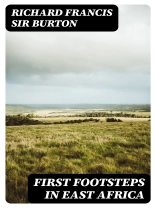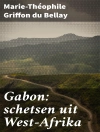In ‘First Footsteps in East Africa, ‘ Richard Francis Sir Burton presents a meticulous account of his 1857 expedition into the heart of East Africa, capturing not only the geography and cultural richness of the region but also the complexities of its sociopolitical fabric. Combining vivid narrative prose with ethnographic observation, Burton engages his readers with an exploration of the indigenous peoples, their customs, and the landscapes they inhabit. The literary context of this work situates itself within the broader Victorian fascination with exploration and imperial discovery, reflecting both the age’s excitement for the unknown and its underlying imperialistic motivations. Burton, a renowned explorer, linguist, and anthropologist, was instrumental in expanding Western knowledge of Eastern cultures during a time when such exploration was both daring and politically charged. His extensive travels throughout the Middle East, Africa, and beyond, along with his proficiency in languages and keen observation skills, equipped him for the challenges of this expedition. Burton’s own experiences of cultural interaction, combined with his deep curiosity about societies beyond the Western world, inform his nuanced portrayal of East Africa’s multifaceted landscapes. ‘First Footsteps in East Africa’ is highly recommended for readers interested in exploration literature, colonial history, or African studies. Burton’s vivid depictions and astute observations invite a deeper understanding of a complex world that continues to resonate today, offering both historical insight and literary richness that captures the spirit of an era defined by discovery and adventure.
Tentang Penulis
Sir Richard Francis Burton (1821–1890) was a British explorer, geographer, translator, writer, soldier, orientalist, cartographer, ethnologist, spy, linguist, poet, fencer, and diplomat renowned for his explorations in Asia, Africa, and the Americas. A true polymath, his adventurous spirit and scholarly interests led him to a deeply versatile life. Burton’s expansive body of work includes his well-known translation of ‘The Arabian Nights’ and the Kama Sutra, yet it is his exploration literature that vividly reflects his hunger for the unknown. Notably, ‘First Footsteps in East Africa’ (1856) is an enthralling narrative of his pioneering journey to Harar, an ancient city in Ethiopia, previously unvisited by Europeans. His work is characterized by a meticulous approach to cultural studies, as well as a unique literary style that intertwines empirical observations with personal experiences. With a command of over 25 languages, Burton’s research and writing laid the foundations for future anthropological pursuits, and his detailed ethnographic descriptions remain a valuable resource for scholars today. His life and works continue to inspire adventurers and academics alike, as they encapsulate the essence of Victorian-era exploration and the unquenchable thirst for knowledge.












